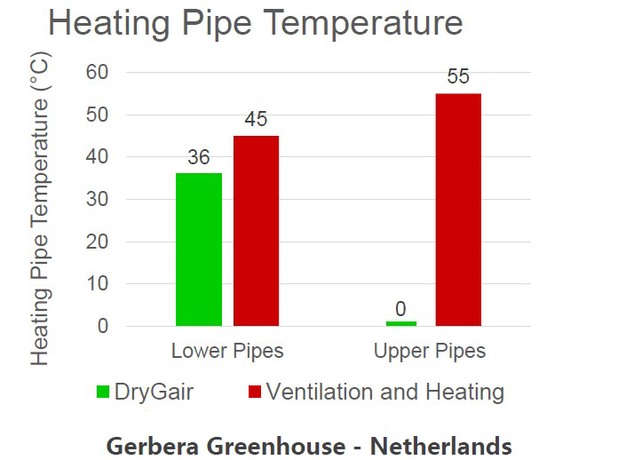Research by Delphy* has shown that effective dehumidification in combination with good air movement can largely prevent botrytis in the cannabis crop. This is of course music to the ears of Eef Zwinkels of Royal Brinkman, who is able to realise exactly this with "his" DryGair at the grower. "I have done the math: we have sold 355 units in the last few years. It gives the grower a steering wheel, guarantees an even and active climate and achieves significant energy savings."
Cornee van Kester, potted plant grower from Honselersdijk, has also noticed this. To be clear, he does not grow cannabis (nor does he intend to), but he is one of the growers who is enjoying the benefits of the DryGair system. First, two were placed in one of the departments, 'to try out', then two more for a second department, then two more for the third, also about 1 hectare in size. A seventh unit will then be installed in the new building, which is currently under construction. "It's a good support system, we have harder plants and need to use fewer resources," says Cornee. "We buy a bit of security with it, as it were."
Resilient crop
Botrytis is not just a problem in cannabis, it occurs everywhere. The optimum temperature and RH (and the balance between the two) are different in every crop. "But the principle is the same everywhere," says Eef. "If the RH goes down, this gives the plant room to evaporate. An evaporating plant is an active plant, a plant in which building materials and nutrients are transported. If a plant is not active, it will suffer from deficiencies and ailments. In short, DryGair creates a more active, more resilient crop, which in turn reduces the need to use crop protection products."
DryGair DGX
One of the recent developments within DryGair, a product by the Israeli manufacturer of the same name for whom Royal Brinkman manages sales in the Netherlands, is the addition of DryGair DGX, a kind of 'mini-DryGair'. "This was actually developed especially for cannabis. The areas there are often smaller, but the need for dehumidification is high here. Moreover, no crop protection products can be used in this crop. The units also find their way into small departments of specialist breeding and seed companies."
The success of the DryGair is, Eef knows, partly due to the lack of a successful imitation. "There simply isn't one. There are industrial building dryers and there is a Chinese copy on the market, but the DryGair takes by far the most litres per kw/h out of the air - namely 4 - and also circulates much more air - 22,400 m3/h. The latter is important in order to achieve an even and active climate."

Example from a Gebera greenhouse: with Drygair, it is possible to save up to 50% on gas (depending on the circumstances, of course). Because windows and screens are closed, there is hardly any loss of sensible and latent heat, and the latter is also "harvested" (the unit blows warmed air into the greenhouse - in some crops, incidentally, a favourable addition to the limited heat emitted by LEDs).
"In addition, DryGair scores the highest for Green Label Greenhouse", concludes Eef. "There are systems that dehumidify with salt, but these use comparatively much more energy. And there are other ventilation systems, but these bring outside air into the greenhouse, which is often humid and/or cold. With DryGair, the windows and screens can remain closed, there is no cold or draught, and you don't have to count on the RH outside. Finally, rising energy prices and the desire for sustainability make growers receptive to such systems. In view of COVID and last year's sales, there is often extra room to invest. The EC subsidy on the DryGair units also helps of course. This scheme is open until the end of November and amounts to 25% over the entire installation."
*Click here for information on the trial
For more information:
Royal Brinkman 
Eef Zwinkels
Woutersweg 10
2691 PR 'S-Gravenzande
eef.zwinkels@royalbrinkman.com
www.brinkman.nl
C&M Kester Potcultures 
Cornee van Kester
Mariëndijk 1A
2675 SV Honselersdijk
info@cmkester.nl
www.cmkester.nl
